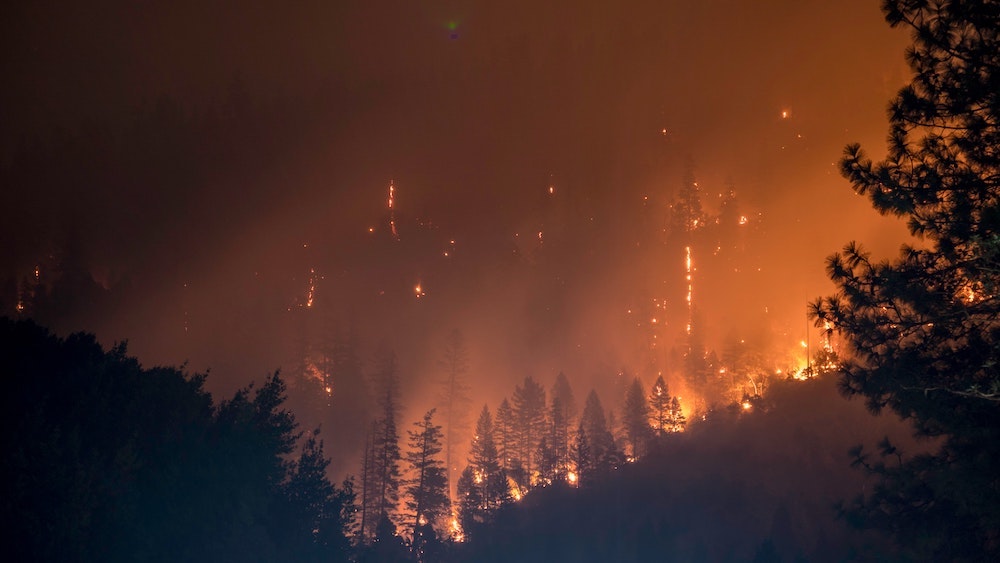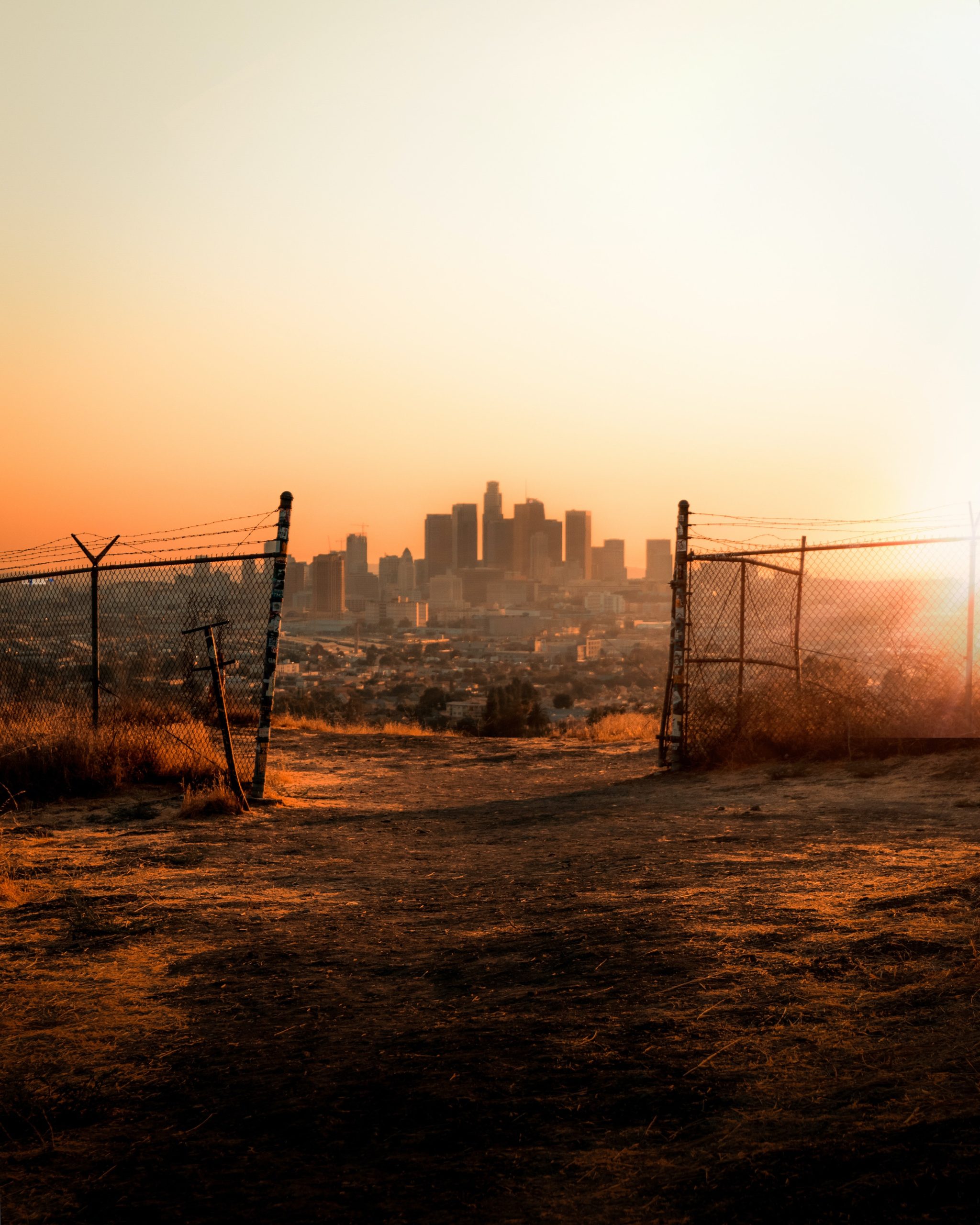interviews
Finding Humor and Hope Amidst the Climate Apocalypse
Allegra Hyde wants us to radically rethink what we value in her short story collection "The Last Catastrophe"

To say that The Last Catastrophe is a dystopic take on humanity’s final hour is to miss the humor in these pages, as well as the tenderness in Allegra Hyde’s gaze. She is looking upon all of us—even those with the greatest culpability—as if she is sad to lose us and for us to lose ourselves. This places her squarely in the lineage of writers like George Saunders, as does the collection’s strip malls, experimental surgeries to consign youth, data points that “extrapolate likely outcomes,” zombie humans, humans with “eyes blank as chicken broth,” bee extinctions, white lies, immigrant detention centers, DNA market, and the discomfortingly familiar algorithm that knows what you want before you even ask, then drops it at your door by drone (“Praise be, we paid”).
In these short stories, “America unfurls in every direction,” and we stand helpless before capitalism’s gaping maw. Hyde approaches her subjects with a naturalist view, reflecting back our foolish instinct to flex our power against nature, how it will kill us or conscript us to an unrecognizable existence. In these pages, we follow a caravan of motorhomes that are over a millennium swallowed into the earth’s core, embark on a doomed mission to save the last remaining moose, join a woman at a center for digital disorders (wondering, all the while, what ours might be), and remain alert to the predatory animals that are lurking.
The people in these stories are lonely, mystified by their own existence—especially by love—and seeking purpose in a collapsing world. There is the woman whose skin turns the color of the Gatorade she drinks after her husband leaves her, the woman who takes in foster husbands, the woman who needs “a little extra attention as she face[s] her own impending obsolescence,” and the émigré searching for his beloved in every surgically supplanted face. The last catastrophe might be our feral state, now that we’ve become unhinged at our own doing. Yet, despite herself, Hyde is not without hope. The writer reminds us that the human spirit has transcended our base self to invent language and pencils, and this same imagination has brought us twenty thousand leagues beneath the sea. Perhaps it is not too late for us to solve the problem of us.
Annie Liontas: These stories look to potential distortions rather than the concrete past, and make us feel as if we’re reading about ourselves in the not-so-distant future. If you’re right and the clock is ticking down, what do you want to say to humanity?
Allegra Hyde: I want to grab everyone by the proverbial shoulders and shake them and say, “Look around at what’s happening. We’re heading towards great danger and towards really difficult times. However, we do still have the opportunity to change course, to radically rethink what we value, and to have a better future.”
AL: You’re saying there’s still hope.
AH: I think so. I think even if we do face great challenges—and we’re facing those challenges already—there’s still the opportunity to find joy, to find meaning, to find connection. And I think that’s something to really hold on to. I’ve been walking around Oberlin, Ohio recently, and we’re having a really weird winter—it’s been like 60 degrees in February. That’s disturbing and that’s objectively bad for the environment and for us as a species, and yet there are flowers coming up. It’s kind of beautiful and charming, and it’s wonderful to walk around in the warm weather with loved ones. And so I try to balance my sense of anger and despair with holding on to what we have.
AL: Satire can be conflated with anger or scathing reproach, but I find it’s usually entangled with grief. Are you writing from a place of mourning? Are there other satirists who work similarly, and whom you admire?
AH: I am writing from a place of grief, both personal and as part of a collective. I think a story like “Frights,” for instance—which is told from the perspective of ghosts and is thinking about extinction and the end of species and ways of living—comes from a part of me that is grieving for the loss of those things. And yet that story is not necessarily all melancholic. It’s processing extinction in a playful, sometimes humorous way. And that reflects my own way of managing grief generally. I think other stories in the collection are also translating or transforming grief in order to cope. I draw from Barthelme in many ways, how he uses absurdity and how he creates emotion by taking unexpected turns and working with humor as a means to access pain and tragedy. This is not an example of a satirist, but I’d also say I draw from someone like Maggie Nelson and a book like Bluets, which is so loaded with grief, but we’re not always looking at it directly. We’re looking at it sideways and diagonally and refracting grief through objects and through ideas.
AL: There is so much humor in these pages, despite the existential grappling. In one of my favorite stories, “Loving Homes for Lost and Broken Men,” we’re told that “husbands without loving homes could end up on the streets, eating junk food, openly farting, harassing young women, impersonating dead celebrities.” Do you think of humor as a survival tool? Is it true in your own life?
AH: Telling jokes and transforming pain and frustration and anger into humor is absolutely a coping mechanism that I’ve used. “Loving Homes for Lost & Broken Men” is a story that’s very much expressing my frustrations with the heteropatriarchy. I think rather than writing a long screed, being able to write a story that invokes humor and that invites people in who would otherwise avoid such subject matter is a way to communicate what I’m feeling. I hope it’s more fun and creates more connections and openness, while also offering catharsis.
AL: What does first-person plural open up for you in a work that is about collective anxiety?
AH: That was a perspective that just kept coming back for me. I didn’t set out to write multiple stories in first person plural, but I found that point of view to be the most effective way to explore certain ideas. Whether I was writing about algorithmic dependence or reckless consumption, speaking as a collective and presenting this hive mind helped me get to the heart of what I wanted to say. The stories in this collection take on many different forms. Some are a couple of pages long, one could be called a novella. But the collection is held together by this larger exploration of what it means to live through the Anthropocene and how we might better understand our reality through metaphor, absurdity, and speculative premises. We are, on one hand, individuals living our specific individual lives, but we’re also very much all caught up in the fabric of society, we’re all part of this cultural consciousness. We’re all complicit in all kinds of collective decisions and actions that create catastrophe. Capturing that in first-person plural felt like another way to speak to that aspect of being human.
AL: I love how you take on the individual and the collective in “The Eaters,” which is about vegan zombies and survivors. One of the characters in that story, a historian and professor, talks about how it is a privilege to see the very last of anything, whether a species or a race. What is the relationship between the end and beauty? The end and the grotesque, the end and nostalgia?
We’re all complicit in all kinds of collective decisions and actions that create catastrophe.
AH: Offering up the perspective that it is, in fact, a privilege to witness the end times might open up avenues for people to actually witness it at all. Because I think many of us, myself included—all the time—want to, and do, bury our heads in the sand. I have environmental news sites that I look at, but sometimes they’re just too horrible to read and I instead go on The Cut and read about makeup. I think reminding ourselves that it’s both a privilege and a responsibility to pay attention, to be informed, to hold onto what is happening in our minds and our bodies is important. It is a unique position that people in the future will, if they exist, recognize clearly.
AL: Though in these stories, we see the raw awareness of youth, and how they’re eager to participate. You write a young person who grows a mysterious horn, a young space traveler, and a teenager who is brave enough to do what the adults in the compound won’t do. We can’t help but admire how they meet the world.
AH: I aspire to be an adult who listens and pays attention and honors the perspectives of young people because my sense is that as many people get older, they really shut themselves off from hearing younger generations. But the truth of the youth has been proven over and over again. In this collection, I really wanted to honor the unique positionality of younger people. They often have to face situations and realities that they in no way created, and I wanted to show how they might cope with such situations in the near future. I’m continually impressed and inspired by youth out in the world today and the youth activism that’s taking place around the environmental movement, with responsible gun use, and elsewhere. Working as a professor, I’m constantly interacting with Gen Z-ers, and I try to continually learn from them and appreciate the position that they’re in.
AL: Marmalade is wonderful! I also love Karoline, who appears in one of the collection’s most innovative stories, “Colonel Merryweather’s Intergalactic Finishing School for Young Ladies of Grace & Good Nature.” In preparation for the space promenade, Karoline is taught the power of white lies as “a bridge between possibility and reality,” and is conscripted to tell them. The complication of what she has inherited and her position in the world is not unlike our own, and you push the reader to think about their own culpability and capitulation.
By lying to ourselves and each other about the overall functionality of our current power structures, we’re setting ourselves up to repeat the same mistakes.
AH: That story stems from my frustration with billionaires investing a gazillion resources into going to space and the idea that the answer to all our problems on earth is by leaving earth and settling a new planet in the galaxy. Besides being impossible, this “solution” perpetuates a classicist, colonial framework. My hope is that this story, which is set in the future, shows how the same oppressive frameworks that have created the crises we’re living through will continue unless we change them. By lying to ourselves and each other about the overall functionality of our current power structures, we’re setting ourselves up to repeat the same mistakes. We won’t solve our problems that way, even if we eventually have cool spaceships.
AL: If the apocalypse arrives tomorrow, does Allegra Hyde survive?
AH: It depends on the kind of apocalypse. I can be pretty crafty and resourceful, but at the same time I do wear contacts. That might be my downfall. If I was trying to gain admittance into a survivalist compound and I needed to demonstrate what I can do—all I can do is teach short fiction. I probably need to brush up on my skills. I used to be good at setting up tents pretty fast.
AL: In a world of constant catastrophe, what is the last catastrophe?
AH: Your own death. Or is it nuclear apocalypse. Or is it when the internet finally goes down. It could be many things. I named the collection the Last Catastrophe because I hoped it would resonate in a glass half empty/half full way. It could be the last catastrophe in the sense that doom is near, or it could be the last catastrophe before we change course.









